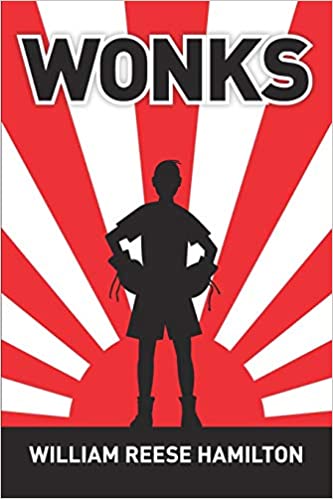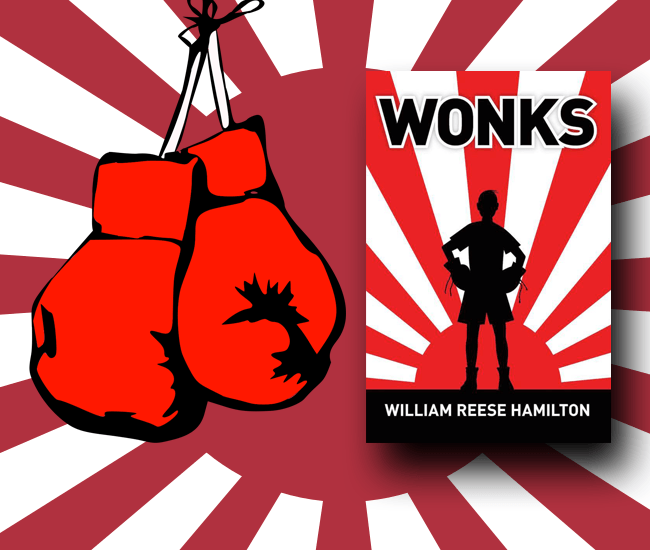Wonks by William Reese Hamilton
Robert Frost, who often used a farmer’s plain-spoken philosophy, had a neighbor say “Good fences make good neighbors.” But like Frost, I’m not so sure. For over three years of my youth, I lived behind the tall masonry wall of Japanese Internment Camp Number One at Santo Tomas University in Manila, the Philippines, and every prisoner lived with the knowledge that that wall was the line you did not cross.
My father had been working for Citibank in China and was reassigned to Manila when Japanese troops advanced in China. We had lived there just nine months, when the Japanese invaded the Philippines and imprisoned all non-Asians in internment camps. The camp was in the heart of the capital city, a city known as the “Pearl of the Orient.” We remained incarcerated there for over three years. This experience inspired my novel, Wonks.
For adults, the primary challenge was to organize 4,000 inmates into a society that could function, providing food and shelter. For children, chaos provided adventure. But that adventure was coupled with severe consequences. Three young merchant marines decided to test the uncrossable line one night, went over the wall, were captured before they could get out of Manila, and were executed.
Hate was my constant surrounding as a child, and depression became a common malady within the camp walls. With the defeat of U.S. forces in Bataan and Corregidor, inmates knew they were in for the long haul. For the first year and a half, everyone was quartered in crowded classrooms, 40 to 50 per room, 600 on the gymnasium floor. Men and women were segregated. No one was starving yet, but everyone looked to be on a diet.
Because of the ballooning population, overcrowding persuaded the Japanese Commandant to relent and allow prisoners to build shanties. Little barrios sprang up across the university campus, and my family was at last united under one roof. However, a new military regime now made life much harder, with harsh punishment and a step-by-step cutting of rations. Now people faced real starvation. As the war in the Pacific turned, each Japanese defeat led to harsher treatment of prisoners.
Among the many tough life lessons I learned there was what it felt like to be considered the enemy—and what’s more, to be an enemy captive.
In short: you wind up disliking your captors.
Moreover, if you have no power to make decisions, and decisions about your life and day-to-day existence are made by those holding you captive, the best and perhaps only way for you to feel that you have not lost all agency is to break the rules. Living outside becomes your challenge, your raison d’etre.
Today, with upward of 100,000 would-be immigrants detained each month at the U.S.-Mexico border in prison-like conditions, this is perhaps the most serious threat we face of all.
In detaining innocent, hopeful people, we are not only harming their family life, their health and their education—we are potentially creating enemies who see Americans as the captors robbing them of their power to make decisions small and large. There’s a good chance they will be compelled to break the rules.
Whether they ultimately settle here in the U.S. or return to their countries of origin, the seed of animosity will have been planted. Paradoxically, although they had no malignant intentions to begin with, they could potentially more easily act out, wherever they end up.
This is not healthy for the United States of America, within our borders or beyond.
As a world power, we should not be in the business of making unnecessary enemies. And if you doubt the possibility of negative repercussions, try looking in and then looking out. Prisoners see the wall as keeping them in. Captors see the wall as keeping the have-nots out. And no captor retains absolute control forever. Before you know it, you could be the one fenced in, looking out, just as I was.
As a former prisoner, living now in a foreign land with many walled-in properties, I remind myself of what Frost said:
“Before I build a wall I’d ask to know
What I was walling in or walling out,
And to whom I was like to give offense.”
This consideration could be the key to peace and prosperity, but without pausing to consider, it could become a fast track to our demise.
Wonks is now available.
Buy this Book!
Amazon




